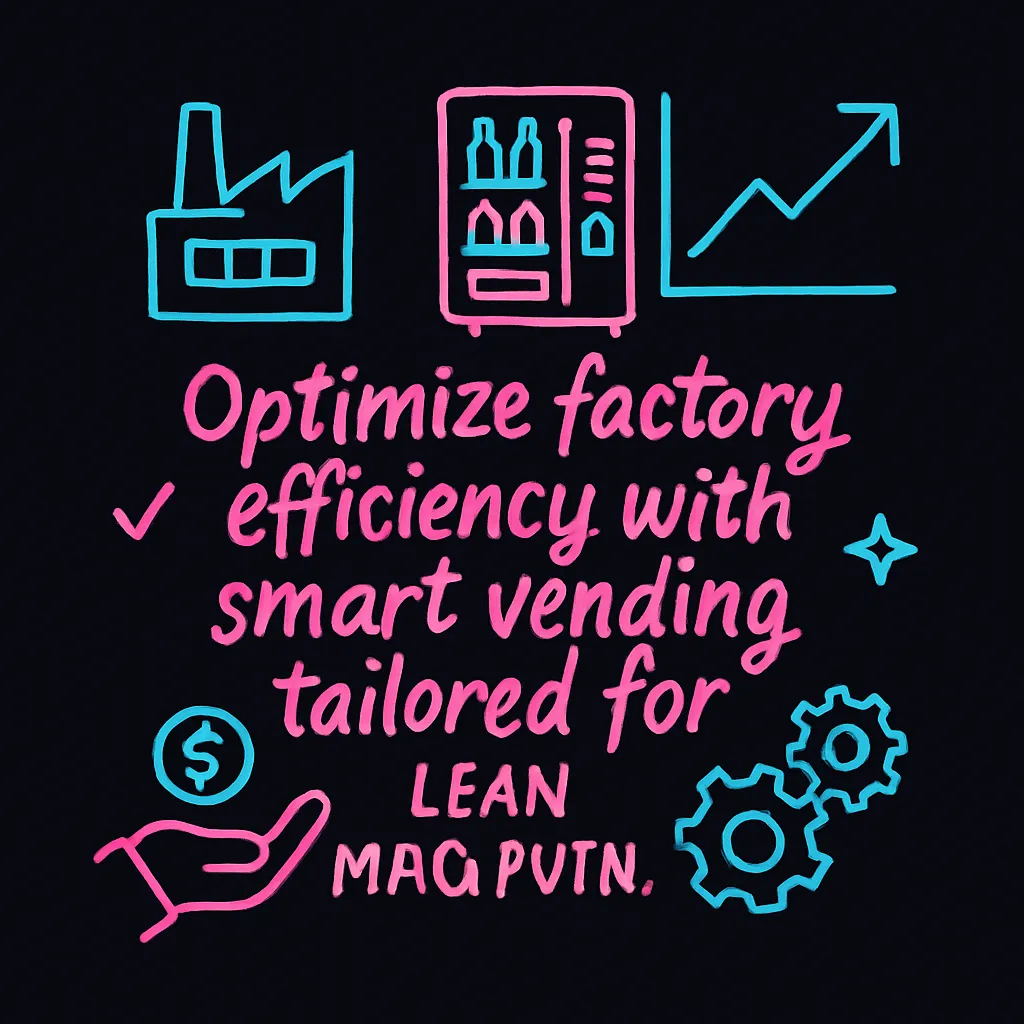Smart Vending for Lean Manufacturing
Optimize factory efficiency with smart vending tailored for lean manufacturing principles. Reduce waste and streamline operations on the production floor.
Back to Vending for Manufacturing ResourcesOptimize factory efficiency with smart vending tailored for lean manufacturing principles. Reduce waste and streamline operations on the production floor.
Back to Vending for Manufacturing ResourcesSmart vending machines are revolutionizing manufacturing by providing instant access to essential tools, parts, and safety gear, directly supporting lean methodologies and minimizing operational delays.
![]() Real-time inventory control reduces waste and optimizes stock levels
Real-time inventory control reduces waste and optimizes stock levels
![]() Immediate access to critical supplies enhances worker productivity
Immediate access to critical supplies enhances worker productivity
![]() Automated tracking ensures accountability and precise supply management
Automated tracking ensures accountability and precise supply management

In the dynamic world of manufacturing, efficiency and waste reduction are paramount. Lean manufacturing principles — like Just-In-Time (JIT) inventory and continuous improvement (Kaizen) — aim to eliminate waste and optimize processes. Smart vending machines emerge as a powerful tool to complement these principles, offering immediate access to critical parts, tools, and personal protective equipment (PPE) right at the point of use.
Traditional methods of managing industrial supplies often involve central storerooms, manual tracking, and delays in retrieving essential items. These bottlenecks directly conflict with lean objectives by introducing waiting time, excess inventory, and unnecessary motion. Smart vending units, however, provide a decentralized, 24/7 accessible inventory solution. Employees can quickly scan their badge to retrieve needed components, automatically tracking usage and ensuring accountability. This not only speeds up workflows but also provides valuable data on consumption patterns.
The core benefit of smart vending in a lean environment is its ability to deliver real-time inventory control. Each transaction is logged, providing precise data on who took what, when, and from where. This level of oversight helps manufacturers:
By bringing supplies directly to the production line, smart vending dramatically cuts down the time workers spend walking to and from storerooms. This reduction in non-value-added time translates directly into increased productivity. Moreover, smart vending machines can be configured to dispense specific PPE items for certain tasks, enhancing workplace safety by ensuring the right equipment is always available and used. This is particularly important in environments where equipment durability for industrial vending is critical.
The true power of smart vending for lean manufacturing comes from its ability to integrate with existing enterprise resource planning (ERP) and manufacturing execution systems (MES). This integration allows for a seamless flow of data, enabling manufacturers to:
Smart vending for lean manufacturing integrates intelligent vending machines with production processes to provide immediate, on-demand access to tools, parts, and PPE, optimizing efficiency and reducing waste.
It supports lean principles by minimizing waste (motion, waiting, overproduction, inventory), improving workflow, and ensuring that necessary items are available precisely when and where they are needed.
Commonly dispensed items include safety equipment (PPE), MRO supplies, specialized tools, spare parts, and even office supplies, all tracked for usage and reordering.
Yes, by providing real-time inventory tracking and automated reordering, smart vending helps reduce excess stock, minimize carrying costs, and prevent stockouts of critical items.
It eliminates time spent searching for supplies, streamlines access to essential tools, and reduces waiting time for critical components, allowing workers to stay focused on production.
Most smart vending systems are designed with intuitive interfaces and easy-to-follow instructions, requiring minimal training for employees to access items.
Data provides insights into consumption patterns, identifies areas for cost savings, optimizes inventory levels, and helps prevent waste and misuse of supplies.
Many smart vending solutions offer integration capabilities with ERP, inventory management, and other production planning systems for seamless data flow.
Yes, smart vending machines for manufacturing are often built with rugged designs and industrial-grade components to withstand harsh factory conditions.
ROI can be significant, achieved through reduced inventory shrinkage, optimized purchasing, increased worker productivity, and decreased waste, often within a short period.